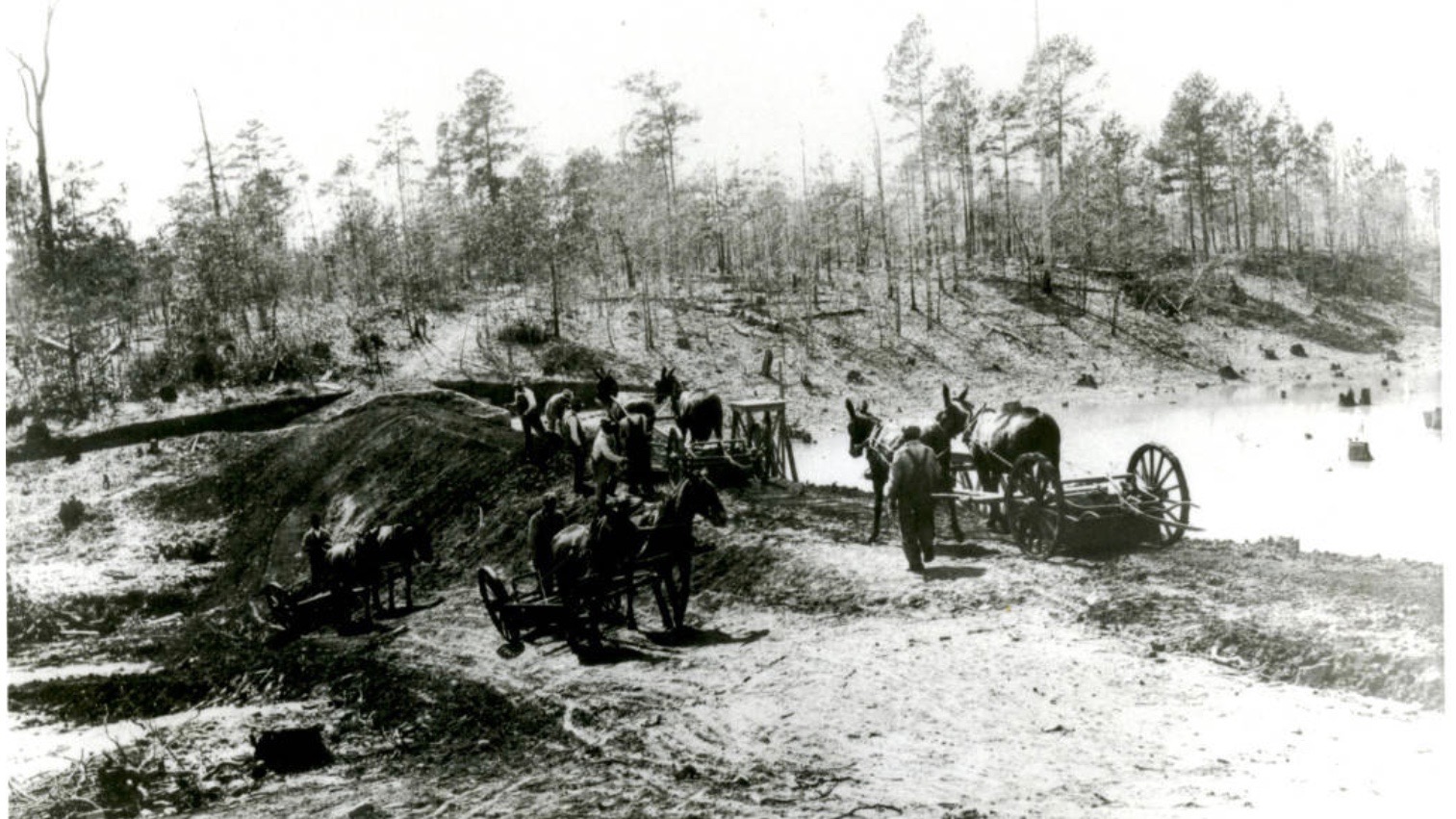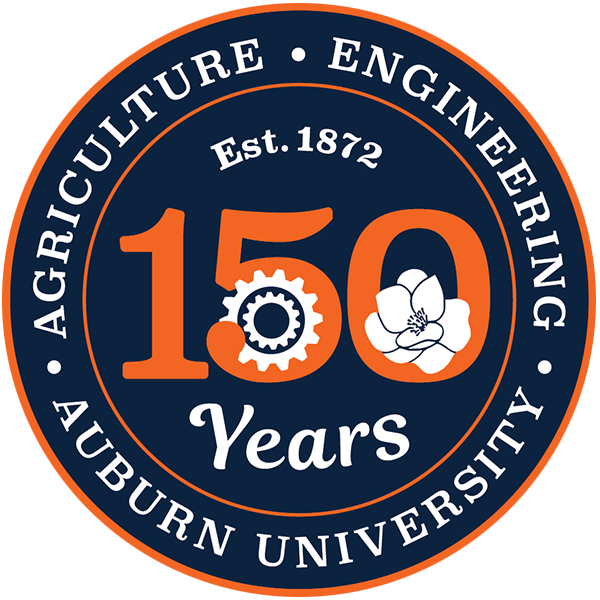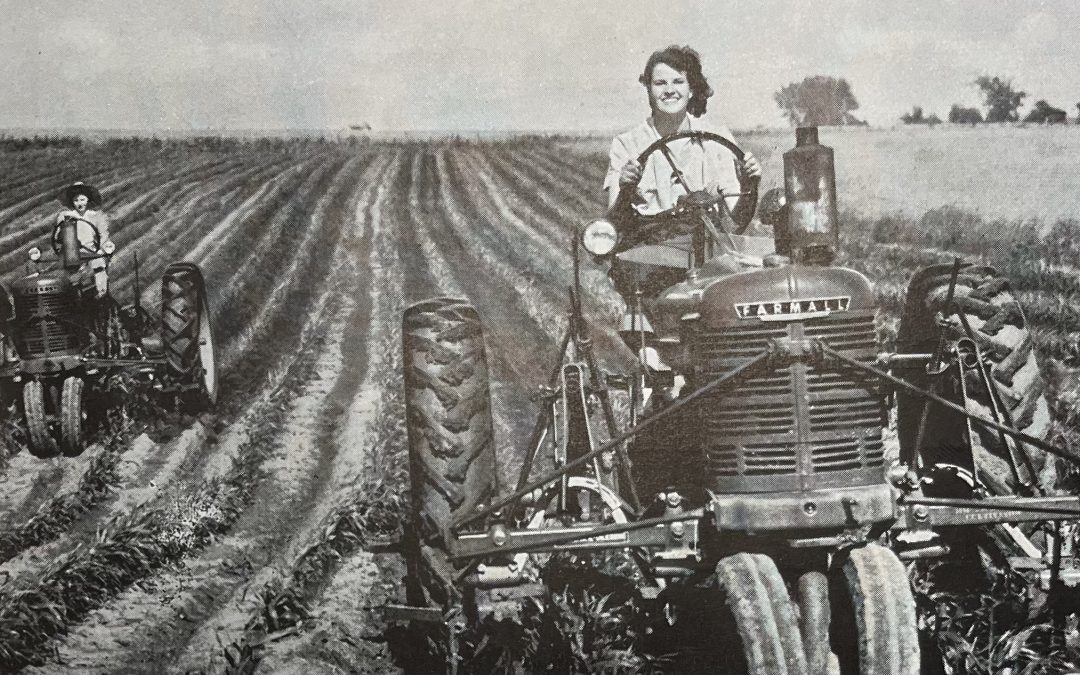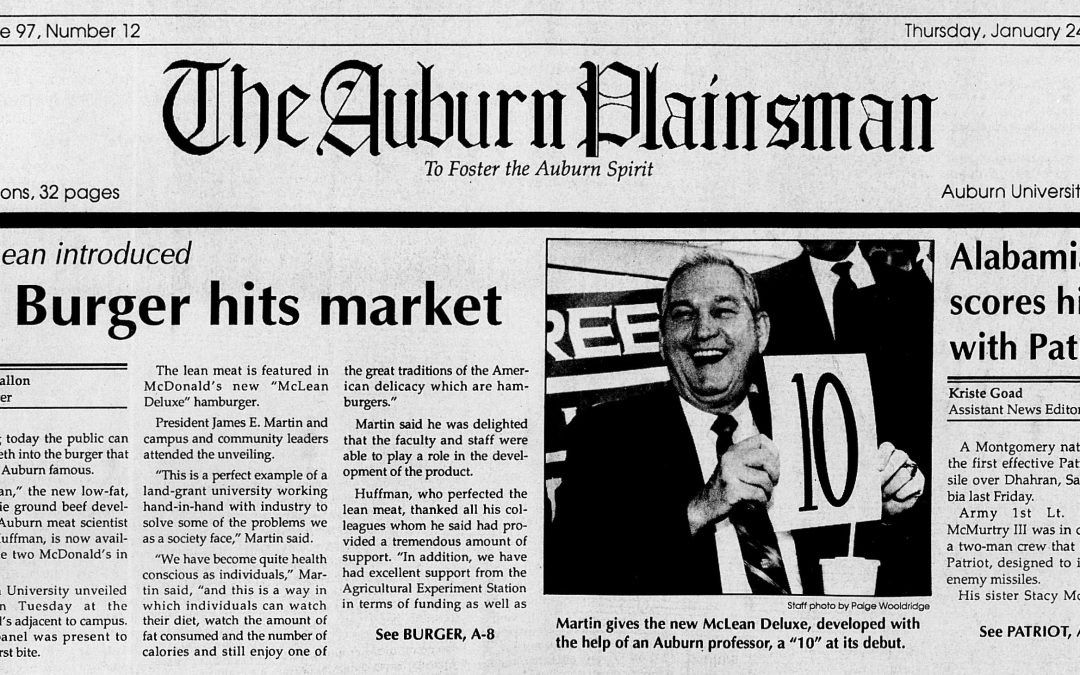Department built on foundation of international implications
THROUGHOUT THE 2022-2023 ACADEMIC YEAR, THE COLLEGE OF AGRICULTURE IS CELEBRATING ITS 150TH ANNIVERSARY WITH CONTENT SHARED FROM ITS SPECIAL EDITION COLLECTOR’S BOOK OF THE SEASON, PUBLISHING IN 2023.
Auburn’s original “fishermen” — men like E.V. Smith, H.S. Swingle and E.W. Shell — laid the foundation for what eventually became the College of Agriculture’s Department of Fisheries and Allied Aquacultures. In doing so, they followed an almost Biblical quest in using the science of fish farming to help feed Alabama and the world.
Initially, research in fisheries at Auburn was focused on recreational fishing, but after Professor Homer S. Swingle studied trout fishing farms in Idaho in the early 1950s, he became interested in developing technology for farm pond management in Alabama. This technology eventually spread to tens of thousands of farms throughout the United States and led to national recognition for fisheries research at Auburn.
After World War II, the U.S. expanded its development programs overseas, and because of Auburn’s work and reputation in recreational fisheries, researchers were asked to give advice in countries that depended on fish as a main food source.
Auburn scientists saw the needs of hungry people around the world and in a few short years, fisheries began to attract sizeable grants and contracts, resulting in more faculty, staff and students. In a short time, Auburn fisheries was having impacts around the world like no other single university department.
The Cooperative Fisheries Unit was first formed in 1967, and its activity expanded to include many of the North American species of fish. Auburn got involved in the international fisheries arena when, in the late 1950s, Swingle visited Thailand, Israel and India to share his knowledge with these countries. This work was sponsored by the Rockefeller Foundation.
Swingle’s involvement in international work continued and expanded into the 1960s with Auburn providing technical assistance to developing countries through the U.S. Agency for International Development (USAID). In 1970, Auburn also was granted money from USAID to strengthen its competency in aquaculture and supporting areas.
Back at home, catfish production offered immense opportunities, and after learning how to reproduce catfish in ponds, the course was set for the development of Alabama’s catfish industry.
In April 1970, Auburn University President Harry M. Philpott approved the reorganization of the fisheries programs. This entailed separating it administratively from the Department of Zoology-Entomology and establishing a complex to encompass the direct phases of the fisheries and allied aquaculture programs.
The principal elements of the complex were an International Center for Aquaculture and a Department of Fisheries and Allied Aquacultures, mainly funded with money from USAID.
The fisheries building — made possible by state funds — was constructed and dedicated in 1972. It was named for Swingle, who was also the first department head, although he only served until 1973 when E.W. Shell became head of the department, serving until 1994.
Throughout its existence, the Department of Fisheries and Allied Aquacultures has accomplished many milestones in fisheries research. One of these was reproduction control in tilapia. Work with tilapia in subsistence aquaculture led to the discovery of technology to control unwanted reproduction. This opened a new commercial aquaculture industry that has allowed tilapia to be sold in most grocery stores and in many restaurants around the world.
Auburn also has led the way in aeration research. Methods to add extra air to aquaculture ponds had existed for some time, but when Auburn scientists began developing scientifically improved aerators, production levels in commercial aquaculture in the U.S. and around the world expanded three- and four-fold.
Another benchmark in fisheries was reached with the construction of two aquatic resource buildings at the E.W. Shell and the designation of the Department of Fisheries into a School of Fisheries. This allowed for the modernization of all research programs within fisheries and the recognition and administrative structure to better manage such a large program.
Other notable developments include construction of the Fish Farming Center in West Alabama and the Marine Extension and Research Center on the Gulf Coast.
A latter-day Auburn fisherman
John Jensen embodies the spirit and vision of Auburn’s original fishermen, though his journey began far away from the Plains, in the cold woods near Duluth, Minnesota, where his family had a lakeside cabin.
“There were six trout streams in the city itself, and when I was about 10 years old, I would fish all of them, bringing home a freezer full of trout for my family,” said Jensen, who was named head of the Department of Fisheries and Allied Aquacultures in 1995 and then interim dean of the College of Agriculture and interim director of the Alabama Agricultural Experiment Station in 2001.
Prior to that, he was appointed fisheries extension specialist for the Alabama Cooperative Extension System. His work in this role led to the founding of the Alabama Fish Farming Center and the Alabama Catfish Quality Assurance Program.
“I always wanted to work with fish,” he said. “As I grew up, I constantly thought about trout and trout fishing and wrote about the fish I caught. People would ask me all the time about the best places to go fishing. Finally, after I got a car, I would spend the entire day fishing near the shores of Lake Superior and its tributary streams. I wasn’t much of student in high school because I spent all my time fishing.”
Jensen did, however, get accepted into college at the University of Minnesota at Duluth, where he majored in fisheries and wildlife management.
“In my first quarter, I got all Ds and an F because I was fishing all the time,” he said. “I wanted to go to the main campus of the University of Minnesota at St. Paul, but I needed a C average to transfer and attend, and it took me two years to get there. I became a good student, graduated, and then I got married and joined the Peace Corps.”
The Peace Corps assigned Jensen to Brazil, where he learned that his work from that day forward would be about improving lives.
“The Brazilian government gave me a boat and a budget for gasoline, and I traveled up and down the Sao Francisco River in central Brazil for about 75 miles,” he said. “My job was to find out what the needs of the fisherman were. They were being exploited by middlemen, and I suggested they needed to form a marketing cooperative which turned out to be successful.
“The government gave us an old fish processing plant, and this enabled the fishermen to develop their markets. But they were over-fishing, so it was apparent they would eventually have to get out of the business. After I was gone for about five years, the plant was shut down. But in the interim, they were successful fishing, and they improved the lives of their families. That was one of many success stories.”
A consultant learned what Jensen was doing and was familiar with people from Auburn, which had a contract from USAID working on a project in northeast Brazil to improve the quality of fishing and to introduce aquaculture.
“Auburn sent me a letter in 1971 asking me for some information about the work I had done,” Jensen said. “I sent them all the information I had collected. Then I met with them in northeast Brazil, including Dr. Shell, and they offered me a job with Auburn. I didn’t even know at the time where Auburn was.”
In the beginning, Jensen drove throughout the Southern U.S. learning what he could about fisheries in the region. Then, he was sent back to Brazil to develop an aquaculture program with the agencies there.
“We started delivering programs to farmers and were successful,” he said. “I was out of Brazil in three years and started graduate school at Auburn, getting my master’s and Ph.D. degrees. Then I was offered a job in extension.
“I love Auburn. It’s a fantastic place, and I couldn’t have asked for anything better. I stuck by my understanding of the job — improving lives through fisheries and through the people who consumed fish.”
Jensen said anything he accomplished during his 40-plus years with Auburn was made possible by the support of others.
“I tried to always motivate our people to do what needed to be done,” he said. “I built contacts with other agencies, with government, any way I could find money to help meet our educational needs. We built the Alabama Fish Farming Center and now it has several scientists looking for ways to improve lives through the production of food fish.”
In reviewing Auburn’s major achievements in fisheries, one that stands out to Jensen is the improvement in fish taste.
“One thing that was constantly a problem was the taste of the fish,” he said. “This bad quality was caused by algae in the pond, and when the fish would go to market, people would get a piece of that and never want to eat catfish again.
“We worked on that for many years, and now fish is tested before it goes to market. If it’s off-flavor, it doesn’t go to market. That’s a huge success that is due to the work of all the people in Extension, NRCS and the Department of Fisheries. It’s a thrill for me now to go to the supermarket, buy fish and not be worried if it’s on-flavor or off-flavor. I haven’t had a bad fish in five years, but the problem used to be common. That’s a success for all us.”
Auburn always stressed a practical approach to solving problems with a healthy dose of positivity, Jensen said.
“We didn’t leave out the science,” he said. “But it’s not always about the heavy science. It’s about reaching out to people and teaching them to do things differently. Auburn continues to lead the world in fisheries by improving lives and helping people.”
Following his time as interim dean and director, Jensen served as Auburn’s special assistant to the president for agriculture from 2004 to 2005. Upon his retirement in 2007, he was named professor emeritus and visiting scholar. He returned to Auburn from 2013 to 2015 to serve as interim director of his former department.






